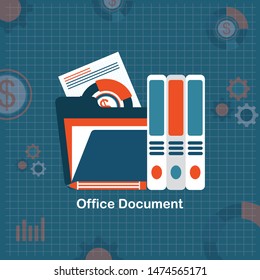Paperwork
5 Tips for Efficient Office Paperwork Filing

<p>Managing office paperwork efficiently can significantly enhance productivity and reduce the clutter that can overwhelm your workspace. With numerous documents coming in daily, having a robust filing system is crucial. Here are five tips to streamline your office filing process:</p>
<h2>Eliminate Unnecessary Paper</h2>
<p>The first step to an efficient filing system is to <strong>reduce</strong> the number of documents you need to keep physically. Here’s how you can do it:</p>
<ul>
<li><strong>Digitize</strong>: Scan documents and save them electronically whenever possible.</li>
<li><strong>Implement a paperless policy</strong>: Encourage digital communication to minimize physical paper usage.</li>
<li><strong>Recycle</strong>: Regularly go through your filing cabinet and dispose of or recycle unnecessary documents.</li>
</ul>
<p>By minimizing paper, you reduce the need for physical storage and decrease clutter, making your filing system more manageable.</p>
<h2>Use a Logical Organization System</h2>
<p>To make retrieval swift, your filing system should follow a logical, intuitive structure. Here are some organizational methods you can consider:</p>
<ul>
<li><strong>Alphabetical</strong>: Organize files by the name of clients, projects, or subjects.</li>
<li><strong>Numerical</strong>: Use numbers to categorize documents by project number, date, or invoice number.</li>
<li><strong>Categorical</strong>: Group documents by department, project type, or function within the office.</li>
</ul>
<p>Implementing a clear system allows everyone in the office to locate documents quickly, saving time and reducing frustration.</p>
<h2>Label Clearly and Consistently</h2>
<p>Labels are the key to a user-friendly filing system. Here are some best practices for labeling:</p>
<ul>
<li>Use standard colors or fonts to differentiate between categories or departments.</li>
<li>Write labels in a way that is <em>easy to read</em> and understand.</li>
<li>Keep labels consistent in format and information placement.</li>
</ul>
<p>Good labeling makes it easier to file documents in the right place and retrieve them later, maintaining an orderly and efficient office environment.</p>
<h2>Establish a Retention Policy</h2>
<p>A retention policy dictates how long different types of documents should be kept before they can be disposed of or archived. Here’s why this is important:</p>
<ul>
<li><strong>Compliance</strong>: Ensure you keep documents for the necessary period required by law.</li>
<li><strong>Space</strong>: Preventing the accumulation of irrelevant documents saves space.</li>
<li><strong>Clarity</strong>: Knowing what can be discarded helps maintain a clean and manageable filing system.</li>
</ul>
<p>A policy can be as simple as guidelines on document retention periods, or as detailed as a written policy including a disposal schedule.</p>
<p class="pro-note">📝 Note: Consult with legal or HR departments to ensure your retention policy complies with relevant laws and regulations.</p>
<h2>Review and Update Regularly</h2>
<p>To keep your filing system efficient, it’s crucial to:</p>
<ul>
<li>Conduct periodic reviews to assess the system's effectiveness.</li>
<li>Remove outdated documents or unnecessary paper.</li>
<li>Reorganize or add new categories as needed.</li>
</ul>
<p>An outdated filing system can become a source of frustration, leading to inefficiencies. Regular updates ensure that your office paperwork remains streamlined and relevant.</p>
<p>By implementing these five tips, your office paperwork filing will become more efficient, less time-consuming, and more conducive to a productive work environment. A well-managed filing system not only makes it easier to find and retrieve documents when needed but also helps in creating a professional, organized office space.</p>
<div class="faq-section">
<div class="faq-container">
<div class="faq-item">
<div class="faq-question">
<h3>Why is reducing paper important for office filing?</h3>
<span class="faq-toggle">+</span>
</div>
<div class="faq-answer">
<p>Reducing paper not only helps in managing clutter but also lowers costs, supports environmental sustainability, and makes document retrieval faster as there are fewer physical files to search through.</p>
</div>
</div>
<div class="faq-item">
<div class="faq-question">
<h3>What are the benefits of a logical organization system?</h3>
<span class="faq-toggle">+</span>
</div>
<div class="faq-answer">
<p>A logical organization system reduces the time spent looking for documents, minimizes errors, and ensures consistency across the office. It also facilitates easier onboarding for new employees.</p>
</div>
</div>
<div class="faq-item">
<div class="faq-question">
<h3>How often should I review my office filing system?</h3>
<span class="faq-toggle">+</span>
</div>
<div class="faq-answer">
<p>A yearly review is recommended, but if your office handles high volumes of paperwork or undergoes significant changes, quarterly reviews might be necessary to keep the system relevant and efficient.</p>
</div>
</div>
</div>
</div>